Unlock stock picks and a broker-level newsfeed that powers Wall Street.
Abigail Summerville and Anton Bridge
Tue, Apr 1, 2025, 3:01 AM 5 min read
By Abigail Summerville and Anton Bridge
NEW YORK/TOKYO (Reuters) - Convenience store chain giants Couche-Tard and Seven & i, who are taking steps to divest thousands of stores they collectively own in North America to ease regulatory concerns ahead of a potential merger, are faced with an early test for the plan - attracting rival suitors for the stores.
The two store operators are likely to struggle to solicit offers from other convenience store chains that might be wary of their own potential antitrust risks arising from such a deal, according to people familiar with the matter and several antitrust experts. Seven & i owns the 7-Eleven convenience store chain, which has more than 12,000 stores in the U.S.
So far, most of the interested buyers for the stores are private equity firms, the sources said. This creates a potential headache for Canada's Couche-Tard and Japan's Seven & i as U.S. antitrust regulators typically frown upon private equity firms as buyers of divested stores, as they are unlikely to be long-term owners.
The U.S. Federal Trade Commission does not normally view investment firms as desirable acquirers of divested stores since the private-equity business model prioritizes short-term returns, the experts added.
"The agency will have a strong preference for a strategic buyer," said Michio Suzuki, an antitrust partner at Baker McKenzie in Tokyo. "From their point of view, the divestiture purchaser should be strong enough to run the divested stores as a viable competitive unit."
The divestiture package proposed by the companies consists of more than 2,000 U.S. stores. However, there is no precedent for private-equity ownership of convenience stores carved out in the aftermath of a big merger, experts said.
Financial acquirers have bought divested grocery and dollar stores out of bigger retail mergers, but they have a mixed track record of running them successfully.
For example, when Dollar Tree acquired Family Dollar in 2015 for around $9 billion, the FTC made the companies divest hundreds of stores. Dollar Tree picked investment firm Sycamore Partners as the buyer for 330 stores, but two years later, Sycamore sold the stores to Dollar General because it could no longer operate them as a viable standalone business.
Sources familiar with Couche-Tard and Seven & i have argued that their divestiture package consists of competitive stores in many states that a private equity firm can operate successfully.
The companies, so far, have received early interest from buyout firms, who are keen to explore the chance to own scaled-up convenience store operations with a nationwide footprint, according to five sources. However, some of the firms are cautious about bidding on an asset coming out of a merger that is not even close to being signed, three of the sources said.
.png)
 German (DE)
German (DE)  English (US)
English (US)  Spanish (ES)
Spanish (ES)  French (FR)
French (FR)  Hindi (IN)
Hindi (IN)  Italian (IT)
Italian (IT)  Russian (RU)
Russian (RU) 








Comments